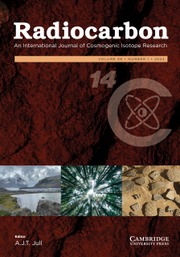Article contents
A Continuous-Flow Gas Interface of a Thermal/Optical Analyzer With 14C AMS for Source Apportionment of Atmospheric Aerosols
Published online by Cambridge University Press: 07 November 2016
Abstract
This article reports on the performance of a continuous-flow interface for CO2 gas feeding into the ion source of a 200-kV accelerator mass spectrometer (AMS) in splitless mode. Distinct CO2 fractions and subfractions produced by a commercial Sunset OC/EC (organic carbon/elemental carbon) analyzer from ambient atmospheric aerosols filters are injected into the source and then analyzed by their 14C/12C ratio in real time. New features are revealed from organic aerosol subfractions, which thermally desorb close to each other and are only visible by real-time analysis. An optimized setup for this purpose is presented for the measurement of CO2 amounts from 3 to 45 μg C. Efficiencies of 4.5–8.0% for the formation of C- ions from CO2 are obtained for sample masses of 5–10 μg C and carbon mass flow rates below 2 µg min–1. However, this ionization efficiency is substantially suppressed at high carbon mass flow rates. The potential of this method for a refined apportionment of aerosol sources is demonstrated with ambient filter samples.
- Type
- Advances in Physical Measurement Techniques
- Information
- Radiocarbon , Volume 59 , Special Issue 3: Proceedings of the 22nd International Radiocarbon Conference (Part 2 of 2) , June 2017 , pp. 921 - 932
- Copyright
- © 2016 by the Arizona Board of Regents on behalf of the University of Arizona
Footnotes
Selected Papers from the 2015 Radiocarbon Conference, Dakar, Senegal, 16–20 November 2015
References
REFERENCES
- 6
- Cited by


